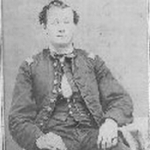 (Host) We’re about to mark the 150th anniversary of a Civil War era event that has reminded commentator and Vermont Humanities Council executive director Peter Gilbert of a timely Vermont story that links a great flood with exceptional bravery – and President Abraham Lincoln.
(Host) We’re about to mark the 150th anniversary of a Civil War era event that has reminded commentator and Vermont Humanities Council executive director Peter Gilbert of a timely Vermont story that links a great flood with exceptional bravery – and President Abraham Lincoln.
(Gilbert) The 1927 flood hit the town of Cavendish, Vermont hard. When a power dam gave way upstream, the raging waters decimated the community, digging a canyon where Main Street had been; it was a half-mile long and fifty feet deep. It would have been deeper, but it hit bedrock.
That night two men escorted seventy-six year old Lucy Sperry, the widow of Civil War veteran William Sperry, through a field to safety in a house on high ground. A month later, she wrote in a letter how the waters raged through the night and she could hear the buildings collapsing, one after the other. She wrote, “The terrible crashing noise I shall never forget.” 
Mrs. Sperry’s was one of the houses destroyed. Lost with the rest of her possessions was the treasured Medal of Honor her husband had received for valor during the Civil War.
Exactly a week before Robert E. Lee surrendered to Ulysses S. Grant at Appomattox, Major Sperry, of the Sixth Vermont Infantry, was fighting at Petersburg, Virginia. According to the medal’s citation, “with the assistance of a few men, [he] captured two pieces of artillery and turned them upon the enemy.”
Miraculously, however, several weeks after the flood, men doing road repair found the medal two miles downstream. It now resides in the Cavendish town offices.
I’m reminded of this story today because it was one hundred fifty years ago tomorrow that President Lincoln signed the law that created the Medal of Honor, the nation’s highest military decoration. It is bestowed for “conspicuous gallantry and intrepidity at the risk of his or her life above and beyond the call of duty while engaged in an action against an enemy of the United States.”
A total of nearly 3,500 medals have been awarded: just over 1,500 were awarded for actions in the Civil War, 124 related to World War I, 464 related to World War II, 133 to the Korean conflict, 246 to the Vietnam War, two to the “Black Hawk down” incident in the Battle of Mogadishu in 1993, four to the war in Iraq, and six to the war in Afghanistan.
A total of forty-seven Vermonters have received the Medal of Honor. Two were for heroism during peacetime, in 1905 and 1924; and two were from World War II: one for heroism on Guadalcanal and the other for commanding a submarine engaged in a daring attack on a Japanese convoy. Forty-three of them were from the Civil War, including not only William Sperry but also drummer boy Willie Johnson, probably the youngest person to ever receive the Medal of Honor; at the time of his heroism he was just eleven years old.